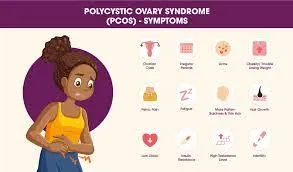
PCOS: What Is It & How To Manage It!
Managing PCOS Naturally:
What Every Parent Should Know About Diet, Metformin, and Synthroid
If your teenage daughter has been diagnosed with PCOS (Polycystic Ovary Syndrome), you’re likely feeling overwhelmed by new terms, medications, and symptoms. But here’s the good news: with the right diet and lifestyle changes, your daughter can feel dramatically better—naturally.
Let’s break it down in simple terms so you know exactly what you’re dealing with and how you can support her.
What is PCOS, Really?
PCOS is a common hormone imbalance that affects how the ovaries work. It can cause:
Irregular or absent periods
Acne and oily skin
Weight gain, especially around the belly
Trouble losing weight
Fertility issues later in life
Mood swings and fatigue
At the core of PCOS is usually insulin resistance—which means your daughter’s body struggles to use insulin effectively. That can lead to elevated blood sugar levels, inflammation, and excess hormone production (like testosterone), which causes many of the symptoms above.
How Changing Her Diet Can Help
The way your daughter eats can make a HUGE difference in how she feels. A PCOS-supportive diet can help balance blood sugar, reduce inflammation, and support hormonal health.
Some simple dietary shifts can lead to:
✅ More energy
✅ Better moods
✅ Fewer cravings
✅ Clearer skin
✅ Regular cycles
✅ Healthy, sustainable weight loss
What to focus on:
Whole, unprocessed foods
Lean proteins
Lots of fiber (veggies, berries, seeds)
Healthy fats (avocados, olive oil, nuts)
Staying hydrated
The Role of Metformin: Pros & Cons
Metformin is a commonly prescribed drug for insulin resistance and is often used with PCOS. While it can help lower blood sugar and support weight loss, it’s not a cure—and it comes with side effects such as:
Nausea or bloating
Diarrhea
Vitamin B12 deficiency (with long-term use)
Low appetite or fatigue
Diet and lifestyle changes can help reduce the need for Metformin. It’s worth discussing this with your daughter’s doctor, especially if side effects are an issue.
Synthroid & PCOS: What You Should Know
If your daughter is also on Synthroid (Levothyroxine) for an underactive thyroid, it’s important to understand how this interacts with PCOS.
Synthroid is a synthetic form of the thyroid hormone T4. It helps regulate metabolism, energy, and body temperature. It's usually well tolerated, but long-term use can cause:
Heart palpitations
Anxiety
Bone thinning
Sleep disturbances (especially if overprescribed)
There are also natural ways to support thyroid health, such as improving iodine, selenium, zinc, and vitamin B12 intake. These should always be used with guidance from a healthcare provider—not as a replacement without supervision.
The Real Solution Isn’t in a Pill—It’s in the Plan
Supplements and medication can help—but they’re only one piece of the puzzle.
What makes the biggest difference long-term is consistency with healthy habits:
🍎 Eating whole, nutrient-dense foods
🚶♀️ Moving the body regularly
🧘♀️ Reducing stress and getting sleep
📊 Tracking progress (not perfection)
When these elements are in place, many women with PCOS see massive improvements—not just in symptoms, but in confidence, energy, and emotional health.
You’re Not Alone—We’re Here to Help
As a parent, you want your daughter to feel her best, thrive in her body, and live without feeling like her health is controlling her. At Butler Elite Training Company, we work with families to create customized nutrition and wellness plans that support hormonal balance from the inside out.
If you’re ready to learn more or would like a one-on-one consultation to support your daughter’s health, reach out today.
💬 Questions? Ready to get started?
Visit us @ www.ButlerEliteTraining.com to schedule your free consult today!
Let’s build a plan that works—for your daughter, and your peace of mind.